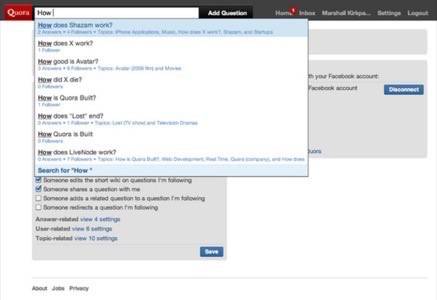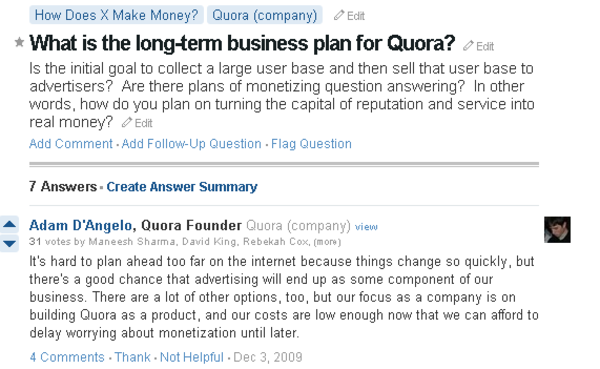Quora, the real-time question and answer service started by two former Facebook employees, will start being indexed by search engines tomorrow, a week after Facebook rolled out the first version of the similar service Facebook Questions.

But with Quora, Facebook, Google-owned Aardvark, the already-publicly searchable Yahoo! Answers and Answers.com and several other Q&A sites, space seems to be getting tight for a business model that requires “tens of millions or hundreds of millions of users before the revenue picture looks interesting,” as one Silicon Valley entrepreneur and former eBay (EBAY) and Yahoo! (YHOO) executive who advises the Q&A site Fluther told Businessweek.
Catch-22
Allowing content to be indexed by search engines will drive new users to Quora, growing the site and making it easier to monetize. But growth can be a Catch-22 for user-content driven sites. Sites like Quora need more users to sell ads and be useful. But they risk being polluted by the young, idiotic and racist denizens of the Internet that
sites like Yahoo! Answers and drive away the more helpful, thinking breed of user.
Screenshot of Quora.

The masses can be high-maintenance
Quora started out as invitation-only, attracting all-stars and smart people like Craig Newmark, Mark Zuckerberg and Ashton Kutcher. Now it’s opened up to anyone with a Facebook or Twitter account, which prevented search engines from indexing the content but gave access to the masses. The answers became less helpful and some of the early, more high profile users fled – although Newmark is still
.
“Quora is needed precisely because Yahoo Q & A has such mainstream adoption. It’s clear the strongest value of Quora right now is the quality of the content, which is present because the calibre of the contributors here is so high. I’d rather consume information from 1,000 high quality contributors than read the aggregation of many more,” wrote Harjeet Taggar, a venture partner at Y Combinator, in response to a question on Quora.
Recommendation systems like Quora’s “Endorsements” feature and the ability to vote up or down any answer can help. But users can only police so much. The site also requires human monitors to verify accounts (a fake Barack Obama had to be banned from the site) and condense repetitive queries.
Screenshot of a Quora question.

The Facebook advantage
Facebook has an advantage because it already has 500 million users in its system, most of them use their real names, and it already has advertising infrastructure in place. Q&A sites clearly have potential value because they are so many of them and no shortage of investor interest. But it’ll be a hard go for Quora and other sites that have to build and curate their user bases from scratch.

















